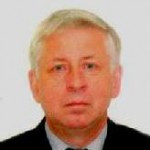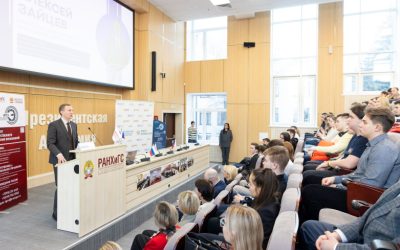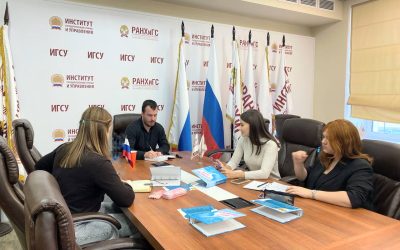Description
The content of the major “Economy and management of the national economy” is the study of economic systems, their genesis, formation, development, forecasting. The distinguishing feature of a majorin relation to other economic specialties, in particular – Economic theory – is the study of economic systems exclusively as objects of management. The object of research can be economic systems of various scales, levels, spheres of action, forms of ownership.
COMPONENTS OF THE SPECIALTY
An integral part of the majoris theoretical and methodological principles, methods and ways of managing these systems, as well as institutional and infrastructural aspects of the development of economic systems.
An important component of the majoris various aspects of studying the subjects of economic systems management (state, transnational, regional, corporate management structures, as well as managers as subjects of management). The subject of this majorresearch is management relations arising in the process of formation, development (stabilization) and destruction of economic systems. An essential distinguishing feature of the majoris the study of economic systems exclusively in the managerial aspect.
SPECIALIZATIONS IMPLEMENTED WITHIN THE INSTITUTE
1. Industry
The content of this area of research: economic relations arising in the process of development of the national economy; methods, mechanisms, tools and technologies for the functioning of economic systems and institutional transformations in a market economy, taking into account the trends of globalization of economic processes in industries. Object of research: national, sectoral, regional and individual economic systems that have developed and are being formed as a result of institutional transformations in primary and aggregated links of industry (enterprises, economic associations, financial and industrial associations of fuel and energy, machine-building, metallurgical and other complexes of the national economy).
2. Management of innovations
The content of this area of research: identification, analysis and solution of the problems of innovative development of the national economy, management of the main parameters of innovative processes in the modern economy, scientific, technical and organizational renewal of socio-economic systems, as well as methods and tools for assessing the results of innovation.
3. Agro-industrial complex and agriculture
The content of this area of research: economic relations in the field of the agro-industrial complex and its branches: agriculture, food and processing industries, agricultural engineering, production of mineral fertilizers, forestry, water and fish industry, wholesale and retail trade in food and agricultural products, services to enterprises and organizations of complex, industrial and social infrastructure.
4. The economy of entrepreneurship
The content of this area of research: patterns and trends in the development of the system of economic management on a proactive, risky basis in order to obtain entrepreneurial income; methodology, theory of formation and development of entrepreneurship; forms, methods, methodological support and business management as one of the strategic resources and internal sources of development of the national economy as a whole and its business structures.
5. Construction
The content of this area of research: the development of economic problems of the current state and forecasting the development of the construction industry under the influence of such trends and factors as the restructuring of national economies, innovative technologies, improving the technological and reproductive structures of investments, increasing the role of socially oriented areas of development, etc.
6. Labor economics
The content of this area of research: economic science, dedicated to the study of trends and patterns of labor activity of people; social and labor relations; reproduction of labor resources and labor force; legal, organizational and socio-economic mechanisms of labor management.
7. Service sector
The content of this area of research: analysis of current trends and forecasts of economic development, service sector management; determination of scientifically grounded organizational and economic forms of activity, typologies of forms of the economic mechanism of enterprises, institutions, organizations and complexes of service industries; improvement of management methods and state regulation.
8. Population economics and demography
The content of this area of research: firstly, population economics as the most important area of economic science, which studies the laws of the economy’s influence on the reproduction of the population as a whole and its individual processes (fertility, mortality, migration), population as a subject and object of economic relations, as a goal and criterion of social progress, economic concepts and socio-economic criteria for the development of human resources, their physical, spiritual and mental health, intellectual potential, and secondly, demography as an independent science that studies the patterns of natural reproduction and migration of the population, their impact on the economy (economic demography) at different historical stages of social development, as well as the size of the population, its types and structures, its demographic behavior.
9. Environmental economics (не уверена по поводу этого термина)
The content of this research area: problems of economic assessment of natural resources and the socio-economic efficiency of their use, forecasting scenarios for the development of socio-ecological and economic systems, improving methods of managing natural resources and environmental protection.
10. Economic security
The content of this research area: assessment of the current state and forecasts of ensuring economic security; development of supporting mechanisms.
Competences and advantages
The area of professional activity of graduates who have mastered the postgraduate program “Economics and Management of the National Economy” includes the spheres of science, technology, technique and pedagogy, covering the totality of tasks of the direction of Economics, including the development of economic knowledge in the process of meeting the needs of society and the state in qualified specialists with higher economic education, primarily in the field of research, development, implementation and maintenance of economic programs and systems; the formation of students’ civil position, the ability to work and life in the conditions of modern civilization and democracy, the accumulation, preservation and enhancement of the moral, cultural and scientific values of society.










